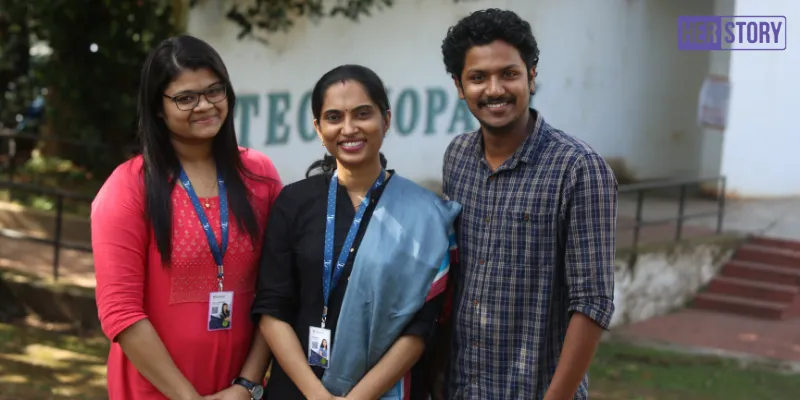India: Edtech Startup Project on Quality Education for Students with Hearing Impairments
September 06, 2019
According to the 2011 census, there are roughly 1.3 million people in India with “hearing impairment”. However, the National Association of the Deaf puts the number at 18 million people, which translates to roughly one percent of the population.
What can be done to empower this one percent with hearing disabilities? How can they be equipped to lead a full and productive life? How can we bridge the gap when it comes to providing quality educational resources for the deaf?
This was what led to the formation of the Digital Arts Academy for the Deaf (DAAD), an edtech product company that focuses on delivering accessible technical education to the deaf across India. Many of these people are under the age of 30 years.

Sulu Naushad, Remya Raj and Abey James
Enabling the deaf with technical education
“Our vision is to make every deaf person a contributor to the world around him and offer access to technical education,” Remya Raj, CEO and Founder of DAAD, tells HerStory.
Hailing from Thiruvanathapuram, Remya was born deaf. With lot of support and care from her parents, she completed her early education from a school for the deaf at a small village called Valakom. She went on to do a bachelor’s in economics from St Thomas College, Kozhencherry, and later worked at an IT firm as a business analyst.
“I was fortunate to receive all the support I needed from my parents. I have always desired to do something to bring the deaf community to the forefront of society,” Remya says.
That’s when she decided to start DAAD with the help of her family friend Sulu A Naushad, who is also hearing impaired (Finance Director), and Abey James, a friend of her husband.
They pitched their idea to the Kerala Startup Mission and were selected as an incubate. The team also moved from Kozhikode to the KSUM Technopark at Thiruvananthapuram. DAAD, which claims to be India’s first startup for the deaf, started operations a couple of months back, and is yet to roll out a full, functional product.
Online and offline courses
DAAD works as a web/desktop application hybrid where students will be able to access courses offline and online. Courses are available in ISL, Natural Sign Language, and context-translated sign language with English subtitles, making it an accessible model for almost everyone who wants to learn.
The platform will have free and paid courses on different subjects ranging from using software and other topics in information technology. It will be a subscription-per-course model, similar to Udemy. Users will be charged for the course s/he opts for through the platform.
The startup began operations with a seed fund of Rs 1 lakh provided by KSUM.
“Funding has been a major problem. There have been difficult times when we did not have enough funds for ongoing development. We are right now exploring crowdfunding to take DAAD forward. But we are very proud of the fact that we are the first deaf startup. Also, being chosen for the final round of the She Loves Tech Summit 2019 was a major achievement,” Remya says.
She adds that quitting a job to pursue your passion always involves risk. “A job ensures a stable income with known challenges whereas a startup is full of uncertainties. I am fortunate to be a part of a team that really supported me in all aspects, irrespective of the challenges they had while communicating. They respected my passion and supported in every way.”
The startup is also excited about its connect with Unity Gaming Technologies, an international brand from which it is learning about technology and implications.
Remya says it’s not easy being a woman entrepreneur in India. “Being deaf added to the challenge but with like-minded supporters and the KSUM, we have been able to overcome hurdles. I hope with more differently-abled people coming up with new ideas and startups, mainstream society will be more accepting of us.”
Source: Your Story

